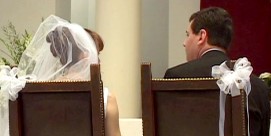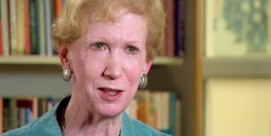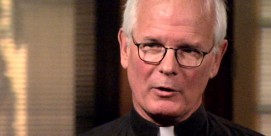In This Episode << SLIDE LEFT TO SEE ADDITIONAL SEGMENTS
Faith and Family in America, Part One: Beliefs and Behavior
BOB ABERNETHY, anchor: Now, the first of four special reports on Faith and Family in America. A poll commissioned by RELIGION & ETHICS NEWSWEEKLY shows that Americans both idealize the traditional family — husband and wife with children — and at the same time are more and more accepting of divorce, cohabitation, and the growing number of families that are nontraditional. Kim Lawton spent time with five different families.
DANNY SMITH: I spend most of my time wishing that I could make the traditional family happen and can’t seem to get there.
AMBER DAVIS: I believe that God has ordained the family to be set up a certain way, and my belief is that it’s the husband and the wife with children.
CHRIS JOHNSON: God’s intention for family is more rooted in things like compassion and social justice.
ARLENE ACKERMAN: I’m not sure there is one biblical model of family.
ALFREDO FARIAS: My wife is, for me, the instrument of my salvation.
KIM LAWTON: Across America, the relationship between faith and family is complicated as people attempt to live out deeply held beliefs amid rapid social change.
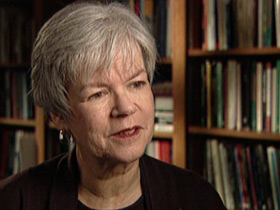
Professor NANCY AMMERMAN (Sociologist, Boston University): Religion has always had a strong interest in the family, because families were seen as the way in which the next generation would be socialized into, taught the traditions of the religious communities.
LAWTON: Many people of faith start with the Book of Genesis, when God put Adam and Eve together and said a man would leave his father and mother to join with his wife and become “one flesh.”
UNIDENTIFIED MINISTER (At Wedding): The bond and covenant of marriage was established by God in creation.
LAWTON: But exactly what that means for today has become a matter of sharp debate in a society where only a quarter of all households live with children in a traditional family.
According to our national RELIGION & ETHICS NEWSWEEKLY survey, 71 percent of all Americans believe “God’s plan for marriage is one man, one woman, for life.”
UNIDENTIFIED MINISTER: Those whom God has joined together, let no man put asunder.
LAWTON: Professor Penny Edgell has studied the connections between religion and family.
Professor PENNY EDGELL (Director of Graduate Studies, University of Minnesota): There’s still a kind of nostalgia for what I call an “Ozzie and Harriet” family — a male breadwinner family. And what I found surprising was that that nostalgia was in both evangelical churches, which we might have expected because we know what their official views about the family are, but also in mainline Protestant and Catholic churches.
LAWTON: Although such ideals persist, there is also growing acceptance of choices which do not live up to that. A majority of Americans now accept divorce, and roughly half accept cohabitation. Even among evangelicals and traditional Catholics, only about a third say that divorce is a sin. Such attitudes have permeated even the most conservative of communities.
Outside Charlotte, North Carolina, descendants of James Samuel Mullis have gathered for their 50th annual family reunion. Danny Smith greets his relatives as they come in the door. It’s a time for catching up on family news and enjoying some country cooking. Danny describes himself as a born-again Christian who attends a nondenominational church. He says family is immensely important to him, and at the reunion he tells family lore, such as how his grandfather helped him find the grave of a relative from the 1860s.
Mr. SMITH: The history of our family is special to us and makes you feel connected. I think it builds your self-esteem, your confidence.
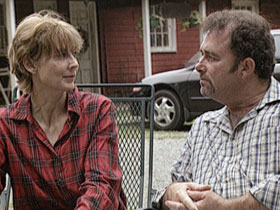
LAWTON: But family has also been the source of deep pain for Danny. He fathered his oldest son 20 years ago out of wedlock. And he’s divorced from the mother of his second son, who’s now 15.
Mr. SMITH: I always dreamed that I was going to be a good father and a good husband and have a home and a family, and that was going to be how I measured my success. And whenever that didn’t work out, it was real — it was extremely hard for me. It was the biggest failure that I ever felt in my life. But, once again, after a while, you just come to terms with it. You make the best of it and you roll on.
LAWTON: Danny doesn’t get to spend the time with his sons that he would like, but he says he tries to capitalize on the moments he does have.
Mr. SMITH: I don’t remember my father ever telling me that he loved me. I tell my boys that I love them all the time, and I ask them, “Do you know how much I love you?” And they’ll say, “More than anything else in the world,” because I’ve told them a million times.
LAWTON: Danny lives on a horse farm with Leslie Boone. They’ve been together for 14 years, but they aren’t married.
(To Mr. Smith): Is that something that was kind of tough for your families to deal with?
Mr. SMITH: It still is.
LESLIE BOONE: It still is. Yeah, I think it is. I think they would rather, you know, we make it legal. What’s the problem in 14 years?
Mr. SMITH: Since I’ve been married — she’s never been married, never had children — I know firsthand the pressure that puts on a relationship. It’s intimidating.
LAWTON: They say if they’d had children together, they probably would have gotten married. They try to replicate family as best they can in the midst of their nontraditional situation. Still, they admit to some internal conflicts.
Ms. BOONE: I think about that a lot, the example that I set, because I do believe in the institution of marriage. As a culture, we have to say you have to stay with your kids. You have to take care of the kids you have. They should have a mother and a father.
Mr. SMITH: I don’t care what society thinks anymore. The trouble that I have with it is the Scripture. I don’t think that I’m a bad person. I don’t think that I’m really setting a bad example, but I think I am living out of the standards set down in the Bible.
LAWTON: Danny’s situation contrasts sharply with that of his niece, Amber Davis, who organized this year’s family reunion. Amber and her husband Corey married at 19 and are coming up on their sixth wedding anniversary. They have two sons, Ethan and Nolan. They are committed evangelicals who met at a Christian high school.
Ms. DAVIS: I always prayed for my husband before I ever met him, so he just seemed like the one.
LAWTON (To Ms. Davis): What did you pray?
Ms. DAVIS: I asked God to give me peace about my future husband and to show me, you know, when I met him if he was the one.
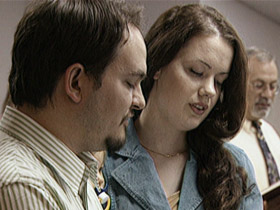
LAWTON: Amber is a stay-at-home mom who intends to homeschool the kids. They call it an old-fashioned arrangement that works for them.
COREY DAVIS: We don’t like the idea of other people raising our kids. And we want to instill in them the values that we want to instill in them and not have somebody else subverting that.
LAWTON: Corey and Amber say they want their children to embrace faith at a young age as they both did. They attend an independent Baptist church and rely on its support to help them teach their kids. They say they try to put God first in their relationship.
Ms. DAVIS: We’ve recently started marriage counseling, too, with our preacher — just kind of as — what was the way you put it?
Mr. DAVIS: Preemptive.
Ms. DAVIS: Preventative maintenance — something like that. And he gave a good example of the triangle.
Mr. DAVIS: The closer that you get to God, the closer you get to each other.
Ms. DAVIS: Right. And we totally believe that.
LAWTON: They never considered living together before they married and are determined to stay together for life. But they’re reluctant to criticize people who don’t live the same way.
Ms. DAVIS: I’ve known people — we have people in our family who — they live together, and they’ve been together for years and years and years. They’re just as good as married. So, I mean, in instances like that, I don’t see as much wrong with that as someone who’s constantly having different people in their home and stuff like that.
LAWTON: They also are reluctant to call divorce a sin.
Mr. DAVIS: I don’t think it’s a sin. I think it’s like a lot of things. God would prefer it not happen if it doesn’t have to, but I don’t think it’s a sin.
LAWTON: Professor Edgell says such views represent a big shift for conservative religious congregations.
Prof. EDGELL: It’s not so much that evangelical pastors or conservative Catholic pastors are coming out and saying, “Oh, divorce is fine and we don’t care about that.” They talk a lot about the human costs. They talk a lot about the pain. But what they’re not willing to do anymore is stigmatize. And I think you really see that reflected in the attitudes of people in local churches on these issues.
LAWTON: There have been big shifts for mainline Protestants as well. Once the bastion of traditional family life, many mainline churches are now widely accepting of alternative family situations. Yet mainline Protestants still have relatively large numbers of traditional families.
Prof. EDGELL: It is ironic that people who are involved in liberal religious communities have stable families, while their rhetoric often displaces family, or a traditional family, from the center of congregational life. Liberal Christians are very serious about the family, but that doesn’t mean that they think the family has to be in this Ozzie and Harriet mold.
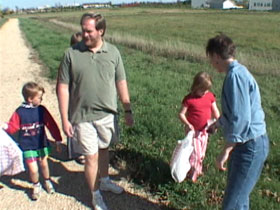
LAWTON: Chris Johnson and his wife Kim Devine-Johnson are lifelong Lutherans who are raising their three children in the same tradition. They’ve been married 19 years and in many ways are a very traditional family, even as they describe their political and theological views as progressive. They reject what they see as patriarchal gender roles, and they teach their children to do the same.
KIM DEVINE-JOHNSON: When we were on vacation this summer, we had been in a restaurant, and we had held hands, and we did our prayer. And then afterwards as we were leaving, a man approached Amos and said, “Well now, young man, you should be really proud of your father for being the man who brings prayer to the table, keeps the family together.” And as we walked out Amos said, “What was that all about?”
Mr. JOHNSON: We certainly don’t buy into the notion that the father is supposed to be the head of the household, either in terms of faith life or any of the kinds of things that are important to a family. I think that we are very much a team.
LAWTON: For the Johnsons, the notion of family is wrapped up in the larger world around them.
Mr. JOHNSON: As a family, as a unit, as a partnership, we recognize that we play a role in the economy. And the choices we make impact the environment. And as a unit, what are we going to stand for in the world?
LAWTON: They have regular family devotions and try to help their children incorporate faith in every aspect of daily life.
Ms. JOHNSON: When we hear the ambulance, we stop what we’re doing to do a prayer for those people who are being helped — those people who are the helpers. We look at creation as though it is truly a gift from God. So part of what we do when we go on our walks is to bring a bag along and do our litter walks, because we’re helping to keep God’s creation in a good state.
LAWTON: Are you concerned about whether your kids end up embracing the faith that you have?
Ms. JOHNSON: If I was really honest with myself I would say, “Oh yes, I hope that they will always be of the Lutheran faith and be progressive in their thought.” And that is what I want for them.
Mr. JOHNSON: It is probably more important to me that they stay progressive than necessarily Lutheran.
LAWTON: Although Americans overall still oppose legalizing gay marriage, attitudes are more mixed about gay adoption. That pleases Arlene and Jacquie Ackerman, a lesbian couple in Lancaster, Pennsylvania. They’ve been together 25 years and adopted 16-year-old Amanda when she was just 20 days old. But because of the laws at the time, only one of them, Arlene, was recognized as the legal parent.
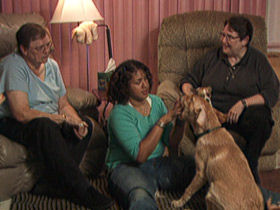
JACQUIE ACKERMAN: Rather than giving up on being a family, we just did what we needed to do, and we have continued to do that.
LAWTON: They went ahead as parents. Jacquie changed her last name to match Arlene’s and then, when Pennsylvania laws changed two years ago, she officially adopted Amanda. She and Arlene say they are frustrated that the full legal benefits of marriage are not available to them.
Ms. J. ACKERMAN: We both feel strongly — I think all three of us do — that it should be recognized, that our union is as legitimate as the union of any two people who make an informed choice about being together and sharing their lives together.
LAWTON: Arlene and Jacquie say for the most part their neighbors in the conservative area have accepted them, even if they haven’t always understood the Ackermans’ family dynamics.
Ms. ARLENE ACKERMAN: We’ve never made a big to-do out of our relationship, but on the other hand, we’ve never hidden who we are.
Ms. J. ACKERMAN: And we have presented ourselves as if we’re okay, and so I think, by and large, people accept us as, “Gee, they’re okay.”
LAWTON: Amanda says she never lets other kids at school harass her for having two moms.
AMANDA ACKERMAN: I’ll say something back. I mean, you’re not just, like, saying words. You’re hurting my family.
LAWTON: Arlene and Jacquie have brought Amanda up in the Metropolitan Community Church, a predominantly gay denomination where Arlene is a leader. They strongly disagree with the idea that God has only one plan for family.
Ms. A. ACKERMAN: For as much as the Christian church talks about the sanctity of marriage, you would think that scriptures would actually say what constitutes marriage in the Bible. And yet, nowhere in the Bible does it say what marriage is, or what the magic words are. There are all kinds of families represented throughout Scripture. I think the one value that I find consistent with Scripture is the value of love.
LAWTON: Religion continues to play a key role for traditional and nontraditional families alike.
UNIDENTIFIED PRIEST (At Baptism): In asking the Church to baptize your child, you’re taking on the responsibility of bringing him up in the practice of the faith …
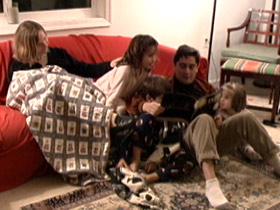
LAWTON: Alfredo and Eileen Farias are Roman Catholics and the parents of four children, including a baby son, Christian, who was just baptized. They see marriage and the raising of their children as something holy.
EILEEN FARIAS: My task as a mother is to ultimately lead them to heaven.
Mr. FARIAS: I always ask myself, “How is it possible that God has been able to give me these creatures to take care of them, to lead them?” It’s an incredible task because these are eternal souls.
LAWTON: Both Eileen and Alfredo say they are trying to incorporate values they learned from their own families, such as reading at bedtime every night. Alfredo in particular is highly critical of divorce.
Mr. FARIAS: I don’t feel like, “Oh, you bad people.” I think, “How sad.” How sad because, in a way, especially if they were Catholic, in a way you have been given such an incredible gift, such an incredible bridge towards happiness, and you somehow lost it.
LAWTON: They believe contemporary American culture is often hostile to marriage and family, and they look to the Church to counter that.
Ms. FARIAS: You cannot be married alone in this culture or in this world. There’s just too many stressors and too many pressures on marriage.
Mr. FARIAS: But the biggest thing is, I think, the culture is really against marriage. The culture, whatever you see, I mean, the TV, the radio, everything, the portrayal of women — it’s just unbelievable.
LAWTON: Because family is fragile, they say, it needs to be carefully tended.
Ms. FARIAS: It’s a gift. And so when something is given to you, you take pleasure in it; you enjoy it, you take care of it.
LAWTON: The social and cultural changes are putting new pressures not only on families themselves but also on the religious congregations that are teaching and ministering in the midst of new realities.
Prof. AMMERMAN: I think you’ve seen a great deal of theological work going on in the last generation as all sorts of religious communities have been trying to figure out what it is they have in their traditions that can help them understand the family worlds that they are encountering today.
LAWTON: That theological work continues amid a growing gap between beliefs and behavior. And it will have a major impact on the future of faith — and family — in America.
I’m Kim Lawton reporting.

